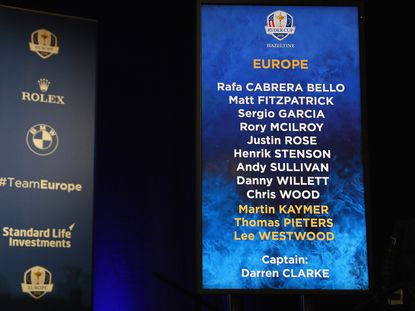Ryder Cup: Team Europe analysis
Should we be worried about the rookies? Or is it lack of form that's more concerning?


An analysis of the finalised European Team for the 41st Ryder Cup matches at Hazeltine, Minnesota. Should we be worried about the rookies or a general lack of form perhaps?
The European Ryder Cup team for Hazeltine has been finalised. There’s been a changing of the guard from the side that won at Gleneagles in 2014, with six new faces this time out. There are just a couple of weeks now until the matches get underway, how is the defending team looking? We give our verdict in the following team Europe analysis.
Do we need to worry about the rookies?
The players are all fully aware of what playing in a Ryder Cup entails. Those who haven’t competed before have seen the intensity of the event on the TV. They’ve watched it, read about it, heard other players talk of it - they’re ready and able to deal with the nerves they’ll face at Hazeltine and will have great support from the more experienced players, the management team plus family and friends. These are top-level professional golfers who have been under serious pressure in tournament situations enough times to be able to focus on their games without succumbing to the stresses of the situation.
Having six rookies in a side isn’t something new for Europe. In 2010, Colin Montgomerie’s team contained six first timers – Rory McIlroy, Martin Kaymer, Ross Fisher, Francesco Molinari, Edoardo Molinari and Peter Hanson. Looking at individual records, post event, the rookies at Celtic Manor secured a total of 9 points from the 21 matches they were involved in. The six veterans gained 17 points from the 23 matches they were involved in. Yes, this suggests the more experienced players provided the backbone of the European victory, but the rookies did play a crucial role – If it hadn’t been for their points, Europe would not have had their outright victory - think Edoardo Molinari’s half with Rickie Fowler towards the back end of the singles for example.
At Gleneagles there were three rookies on Paul McGinley's side – Victor Dubuisson, Jamie Donaldson and Stephen Gallacher. Between them, they gained 5.5 points out of 9 matches – the rookies had a winning record.
Galvin Green Ryder Cup suit revealed:
Get the Golf Monthly Newsletter
Subscribe to the Golf Monthly newsletter to stay up to date with all the latest tour news, equipment news, reviews, head-to-heads and buyer’s guides from our team of experienced experts.
When Europe last lost the Ryder Cup at Valhalla in 2008, the four rookies were not to blame. Justin Rose secured three points from four and, in total the rookies secured 7 points from 13 matches they were involved in: the rookies had a winning record there too. It was the more experienced players that faltered. The 8 who had played in previous Ryder Cups got just 11.5 points from the 31 matches they were involved in.
Basically – no, we don’t need to worry that there are six rookies in the team.
What about the captain’s picks?
There will always controversy around the captain's picks, but the selection of Pieters, Kaymer and Westwood seemed pretty logical. Pieters is on superb form and is the kind of player that can blow opponents away if he gets on a roll. Kaymer is a double Major winner and has proven he can handle the greatest pressure – see his winning putt at Medinah in 2012. And Westwood is incredibly experienced with nine previous matches behind him. He’s a great partner in fourball and foursomes matches as his long game is so incredibly solid.
Russell Knox was very unlucky to miss out on a pick but his decision to base himself so much in the U.S. hurt his chances. The Scot could have replaced any of the three picks but there will always be someone who just misses out and, unfortunately for the Scot, this time it was him.
Do we need to worry about form?
Form of the team at this stage should be far more worrying for European fans than a lack of experience or any quibbling about the captain’s picks.
Matthew Fitzpatrick has not been on the sort of form that saw him secure 10 top-10 finishes in 2015. Although he’s enjoyed a win in the Nordea Masters this summer, his results in general have been a little patchy. A missed cut in the Made in Denmark and a barely scraped one in the European Masters give cause for concern and his short to mid range putting has not been as infallible as it was during last season.
Andy Sullivan is another not firing on all cylinders. He looked fantastic at the end of 2015 when he won the Portugal Masters and came close in the DP World Tour Championship. But after missing cuts in the Czech Republic, Denmark and the European Masters, he won’t exactly be full of confidence heading to Hazeltine. Dustin Johnson will hardly be shaking in his boots.
Chris Wood hasn’t had a top-10 finish since June and Danny Willett’s game has dipped since The Masters, although he is playing some decent golf in Switzerland at the time of writing.
And of the more established stars, Rory McIlroy – such a figurehead of the team two years ago - is not the force he was then. In 2014 he went to the Ryder Cup as Open and USPGA champion and World Number 1. This year, he’s dropping down the rankings and there are questions around his putting. He’s definitely not the intimidating opponent he was at Gleneagles.
Another concern is Henrik Stenson’s knee. The Swede was on sublime form through the summer as he claimed The Open Championship and Olympic silver. But a slight meniscus tear in the knee, that gives him discomfort when walking, caused him to pull out of The Barclays and withdraw from the BMW. He hopes to rest up and be OK for Hazeltine, but will he be able to stay match-fit?
Europe then has a number of players with questionable form and a key player with a potential injury. Should we be worried about form? Yes. At this stage it looks as though team Europe will have its work cut out against a U.S. side hungry to regain the Ryder Cup on home soil. All 12 likely USA team members are currently in the top-25 on the Official World Golf Ranking, team Europe has just five in that top-25. Despite past results, If Europe wins at Hazeltine it will be quite an upset.

Fergus is Golf Monthly's resident expert on the history of the game and has written extensively on that subject. He is a golf obsessive and 1-handicapper. Growing up in the North East of Scotland, golf runs through his veins and his passion for the sport was bolstered during his time at St Andrews university studying history. He went on to earn a post graduate diploma from the London School of Journalism. Fergus has worked for Golf Monthly since 2004 and has written two books on the game; "Great Golf Debates" together with Jezz Ellwood of Golf Monthly and the history section of "The Ultimate Golf Book" together with Neil Tappin , also of Golf Monthly.
Fergus once shanked a ball from just over Granny Clark's Wynd on the 18th of the Old Course that struck the St Andrews Golf Club and rebounded into the Valley of Sin, from where he saved par. Who says there's no golfing god?
-
 'Gator Netting Is In Place' - Chevron Championship Venue Prepared For 'Safe' Winner's Jump
'Gator Netting Is In Place' - Chevron Championship Venue Prepared For 'Safe' Winner's JumpA tradition which began at the tournament's previous home could continue this year - if the champion is feeling brave enough...
By Jonny Leighfield Published
-
 New Balance 997 SL Golf Shoe Review
New Balance 997 SL Golf Shoe ReviewNew Balance produce some extremely stylish footwear and, in this review, Matt Cradock takes their spikeless 997 SL onto the course
By Matt Cradock Published